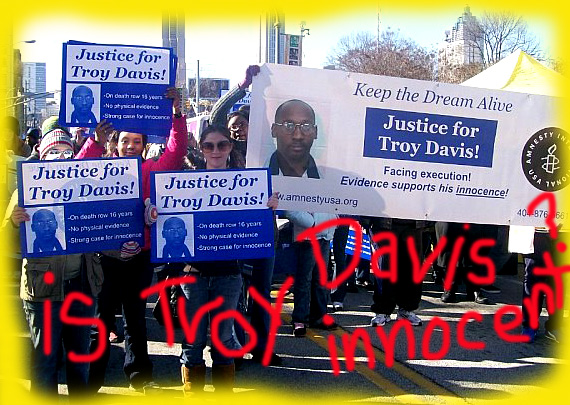
Tuesday, the Supreme Court declined to hear the appeal for 40-year-old Troy Davis, the Georgia inmate who was convicted in 1991 of murdering Savannah police officer, Mark A. MacPhail. The Supremes made their decision without comment or explanation. SCOTUS’ refusal to hear the case clears the way for Georgia officials to excute Davis, likely very soon.
The back story as to why Troy Davis likely didn’t commit the crime of which he was convicted is here and here.
The question is, did the Supreme Court chose the desire for finality over the principle of innocence? Is the actual murderer walking free simply because, rather than go against the legal fashion of the moment regarding death penalty cases, SCOTUS would rather get things over with?
Attorney Andrew Cohen of CBS analyzes the heart of this tragic and legally appalling situation very well. Here are the relevant clips.
The decades-long, law-and-order-fueled trend toward restricting appellate avenues in criminal cases may be reaching its gruesome but inevitable conclusion in the case of Troy Davis, a death row inmate who apparently will be executed soon despite a series of post-trial revelations about his lack of culpability that ought to shock the conscience of even the most ardent supports of capital punishment.
Davis, who is black, was charged, tried and convicted in Georgia for murdering a white police officer. He was sentenced to death in 1991. There was no physical evidence linking him to the crime. There was no DNA. There was no murder weapon found on him. Since his trial, seven of the nine main prosecution eyewitnesses against him have recanted their trial testimony. Some of these witnesses claim police coercion or harsh interrogation tactics caused them to be untruthful at trial.
Moreover, a handful of witnesses have stepped forward to claim that another man has confessed to the crime. This “other man,” according to the Atlanta Journal-Constitution, is one of the two remaining trial witnesses who, not surprisingly, still claims that Davis shot the officer. The final eyewitness (of the nine we are concerned with) initially told the police that he could not identify Davis at the crime scene before later changing his tune at trial and incriminating Davis. Even during this new age of DNA there has been no great movement to resolve these legal and factual conflicts.
Short of seeing a videotape of that other fellow’s confession, it’s hard to imagine a scenario that more clearly calls out for a full and independent evidentiary hearing, or even a new trial, to assess the validity of the changed narrative about Davis’ role in the crime. And, indeed, in an earlier time in our history it is quite likely that the federal courts would have ensured such a review. No more. The highly-politicized, step-by-step closing of the courthouse doors to appeals like this-the intentional restriction of meaningful appeals rights-may send an innocent man to his death.
When Davis’ appeal on these issues made it to the Georgia Supreme Court the judges there denied him any relief and declared in a 4-3 vote that there must be “no doubt of any kind” but that the trial testimony was of the “purest fabrication” in order to warrant interceding on Davis’ behalf. Got that? It takes only the absence of “reasonable doubt” to convict someone of murder but in Georgia to properly investigate a condemned man’s strong claim of innocence judges have to have “no doubt” at the outset of the inquiry that the inquiry will prove his innocence. How, one dissenting Georgia justice asked, can anyone ever meet such a standard?It’s a game that Davis can’t win; and that’s precisely how leaders of the anti-appeal movement have wanted it. As the criminal justice system has become more conservative, the courts and the Congress have relentlessly created (or recognized) barriers to meaningful appellate review.
Read the rest.

The title of this says it all and I reiterate the sentiment. Mr. Davis, drop dead and don’t worry the State will help you along to that end. That is justice.